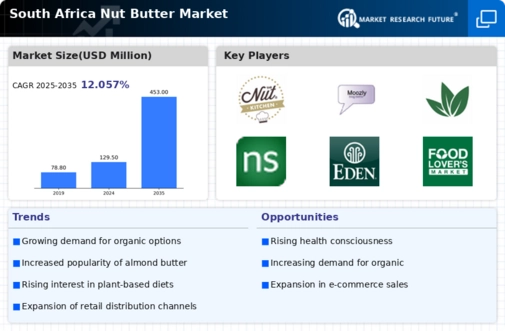Market Growth Projections
The Global South Africa Nut Butter Market Industry is poised for substantial growth, with projections indicating a market value of 450 USD Million in 2024 and an anticipated increase to 1200 USD Million by 2035. This growth trajectory suggests a robust compound annual growth rate of 9.33% from 2025 to 2035. Such figures highlight the increasing consumer interest in nut butters, driven by health trends, product innovations, and rising disposable incomes. The market's expansion reflects broader shifts in dietary preferences and the growing acceptance of nut butters as versatile and nutritious food options.
Rising Disposable Incomes
The rise in disposable incomes among South African consumers is contributing positively to the Global South Africa Nut Butter Market Industry. As individuals have more financial flexibility, they are more inclined to spend on premium food products, including nut butters. This trend is particularly evident in urban areas where consumers are increasingly willing to invest in health-oriented and gourmet food items. The growing middle class in South Africa is likely to drive demand for high-quality nut butters, further enhancing market growth. This increase in purchasing power is expected to support the market's expansion, aligning with the projected growth trajectory.
Diverse Product Innovations
Innovation within the Global South Africa Nut Butter Market Industry plays a crucial role in attracting consumers. Manufacturers are continuously developing new flavors, blends, and formulations to cater to diverse palates and dietary preferences. For instance, the introduction of nut butters infused with superfoods or unique flavor combinations has captured consumer interest. This innovative approach not only enhances the product range but also addresses the growing demand for functional foods. As a result, the market is expected to expand significantly, with projections indicating a rise to 1200 USD Million by 2035, driven by these creative product offerings.
Rising Health Consciousness
The increasing awareness of health and wellness among consumers is a pivotal driver for the Global South Africa Nut Butter Market Industry. As individuals seek nutritious alternatives to traditional spreads, nut butters, rich in proteins and healthy fats, gain popularity. This trend is evidenced by the projected market value of 450 USD Million in 2024, reflecting a growing preference for health-oriented food products. Consumers are increasingly opting for natural and organic nut butters, which are perceived as healthier options. This shift towards healthier eating habits is likely to propel the market further as more individuals incorporate nut butters into their diets.
Increased Distribution Channels
The expansion of distribution channels is a significant driver for the Global South Africa Nut Butter Market Industry. Retailers are increasingly recognizing the demand for nut butters and are incorporating them into their product offerings. The growth of e-commerce platforms has also facilitated easier access to a variety of nut butter products, allowing consumers to explore different brands and flavors. This increased availability is likely to enhance consumer engagement and drive sales. As the market continues to evolve, the proliferation of both physical and online retail channels will play a crucial role in sustaining growth and meeting consumer demands.
Growing Vegan and Plant-Based Trends
The surge in veganism and plant-based diets is a notable driver for the Global South Africa Nut Butter Market Industry. As more consumers adopt plant-based lifestyles, the demand for nut butters, which serve as excellent protein sources, is likely to increase. This trend aligns with the broader global movement towards sustainable eating practices. The market's growth is further supported by the increasing availability of nut butters in retail outlets and online platforms, making them more accessible to a wider audience. Consequently, the market is projected to experience a compound annual growth rate of 9.33% from 2025 to 2035, reflecting the sustained interest in plant-based nutrition.





















